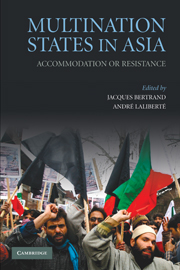Book contents
- Frontmatter
- Contents
- List of Tables and Figures
- List of Maps
- List of Contributors
- Acknowledgments
- Maps
- 1 Introduction
- 2 Revolutionary State Formation and the Unitary Republic of Indonesia
- 3 The Crisis of Border States in India
- 4 Pakistan: Neither State Nor Nation
- 5 Constitutional Politics and Crisis in Sri Lanka
- 6 The Dilemmas of Burma's Multinational Society
- 7 The Double-Edged Sword of Autonomy in Indonesia and the Philippines
- 8 China and the Virtual Taiwan Nation
- 9 The Failure of Ideologies in China's Relations with Tibetans
- 10 Leninism's Long Shadow in Central Asia
- 11 Conclusion
- References
- Index
3 - The Crisis of Border States in India
Published online by Cambridge University Press: 05 June 2012
- Frontmatter
- Contents
- List of Tables and Figures
- List of Maps
- List of Contributors
- Acknowledgments
- Maps
- 1 Introduction
- 2 Revolutionary State Formation and the Unitary Republic of Indonesia
- 3 The Crisis of Border States in India
- 4 Pakistan: Neither State Nor Nation
- 5 Constitutional Politics and Crisis in Sri Lanka
- 6 The Dilemmas of Burma's Multinational Society
- 7 The Double-Edged Sword of Autonomy in Indonesia and the Philippines
- 8 China and the Virtual Taiwan Nation
- 9 The Failure of Ideologies in China's Relations with Tibetans
- 10 Leninism's Long Shadow in Central Asia
- 11 Conclusion
- References
- Index
Summary
There are many reasons for the crisis of several so-called border states in India. My objective in this chapter is not to summarize the causal narrative of these crises. Rather, I wish to draw the attention of the reader to one factor to which enough attention has not been paid. My very tentative claim appears to be in line with the main contention of the editors of this book: the governing elite in India, perhaps even the larger political elite, has always had a conceptual block about recognizing multiple nationalities in India. But this way of putting it may, in the Indian case, be too crude. I am not suggesting that India should have been named and understood as a multination state from its very inception. My point, I believe, is more subtle: given India's size and complexity, it should have recognized and worked with what might be called a deeply asymmetrical federalism that recognized some societies within it as nations but not others. Over time, the governing elite in India did imagine an inclusive-enough state in India, one that granted recognition to different cultural communities, but it just fell short of grasping the precise form of recognition for which some societies increasingly yearned. This was a political as much as a conceptual failure. Moreover, the hold of some conceptions was so strong that the elites could not imagine an even more inclusive variety of federalism.
- Type
- Chapter
- Information
- Multination States in AsiaAccommodation or Resistance, pp. 51 - 80Publisher: Cambridge University PressPrint publication year: 2010
- 2
- Cited by



